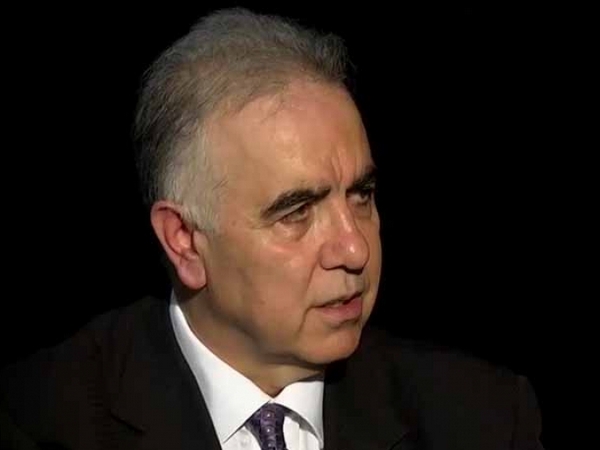 08.09.2016
08.09.2016TURKEY CONSPIRED WITH ISIS IN ITS DECEPTIVE INVASION OF SYRIA
By Harut Sassounian
Publisher, The California Courier
http://www.TheCaliforniaCourier.com
Syria has been the hub of shifting international military and political intrigues since the start of the ‘civil war’ in 2011. The diverse conflicting sides include: Hezbollah, Iran, Islamic State (ISIS), Israel, Jordan, Kurdish fighters, Lebanon, Qatar, Russia, Saudi Arabia, assorted terrorists from around the world, Syria, Syrian opposition groups, Turkey, the United States, and other NATO states.
The latest ominous development is the Turkish invasion of the Syrian border town Jarablus, which had been occupied by ISIS. However, contrary to Turkish propaganda, Turkey’s military did not invade Syria to chase out ISIS, and the U.S. Air Force did not drop any bombs on Jarablus to pave the way for the advancing Turkish troops, according to David Phillips, Director of the Program on Peace-Building and Rights at Columbia University’s Institute for the Study of Human Rights. Phillips had served as a Senior Adviser and Foreign Affairs Expert to the U.S. Department of State under Presidents Clinton, Bush, and Obama.
Turkey’s actual plans were to prevent further inroads into North-West Syria by Kurdish YPG fighters (People’s Protection Forces) who have been the most reliable military allies of the United States in countering ISIS, while Erdogan calls the YPG 'terrorists'.
Phillips revealed in his Huffington Post article that “Turkish-backed Islamists never engaged ISIS in the so-called battle for Jarablus. Before invading, Ankara made a deal with the Islamic State. Rather than resist, ISIS forces simply changed into FSA [Free Syrian Army] uniforms. Jarablus was ‘liberated’ from ISIS with barely a shot.” ISIS had evacuated all civilians from Jarablus prior to the Turkish invasion because it did not “want civilians to identify newly clad FSA members as hard core ISIS fighters,” Phillips wrote.
“It is not surprising that Erdogan and ISIS made a deal. ISIS and Erdogan’s Justice and Development Party (AKP) are ideologically aligned,” Phillips asserted, since “they are both branches of the Muslim Brotherhood. Despite official denials, there is a mountain of evidence that Turkey provided weapons, money, and logistical support to Islamists in Syria beginning in 2014. Turkey also underwrote the Islamic State by transporting its oil and selling it on the international market. About 500 Islamist fighters are still transiting from Turkey to Syria each month.”
Turkish leaders have made no secret of their true aim. Erdogan announced that his objective is to go after YPG and “terror groups that threaten our country.” Foreign Minister Mevlut Cavusoglu pledged that Ankara would “do what is necessary” to keep the Kurdish fighters away from the Turkish border.
Washington is not pleased with Turkey’s misdirected military actions in Northern Syria. Senior Pentagon official Brett McGurk told CNN that “the Turks never cared about Jarablus until the Kurds wanted to get there.” McGurk called the Turkish attacks on Kurdish fighters “unacceptable and a source of deep concern” for the United States.
The Editor of Veterans Today was also highly critical of the Turkish invasion of Syria as reflected in his cynical explanation: “Turkish troops who had been in Syria for years dressed up as ‘ISIS’ have simply gone home to Turkey, had a good wash and shave, put back on their Turkish uniforms then returned to Syria.”
Saadeddine Somaa, a Syrian Arab militant who joined the Turkish incursion into Syria, expressed to The New York Times his disappointment for being misled into fighting the Kurds instead of ISIS and the Syrian government. “Everyone is pursuing their own interests, not Syria’s,” Somaa complained.
The New York Times article stressed that due to in-fighting, the rebel groups “risk reinforcing criticism that they are Turkish and American proxies at best, de facto allies of ISIS at worst.” Furthermore, “Turkish airstrikes had killed 35 civilians in Kurdish-held villages. And there was a video online showing rebels kicking prisoners from the Kurdish-led militias.” Some of the fighters accompanying the Turkish troops’ incursion into Syria, such as members of Nooredine al-Zinki, “were accused of having ties to Qaeda-linked groups” and were “widely condemned when a group of its fighters videotaped themselves beheading a young prisoner…. Its participation in the Jarablus operation was an indication that it has not been completely shunned, at least by Turkey.”
David Phillips ended his revealing Huffington Post article with an ominous prediction: “Syria will be Erdogan’s Waterloo. The U.S. Government must not be tethered to Turkey’s sinking ship.”
Return
Another materials of author
- TURKISH PRECONDITIONS SHOULD BE COUNTERED BY ARMENIAN PRECONDITIONS[19.12.2018]
- U.S. AMBASSADOR TO ARMENIA SHOULD CALL THE ARMENIAN GENOCIDE, A GENOCIDE[12.12.2018]
- SEN. MENENDEZ DELAYS SENATE CONFIRMATION OF US AMBASSADOR TO AZERBAIJAN[05.12.2018]
- SHOULD ARMENIA GRANT CITIZENSHIP TO FOREIGN INVESTORS?[28.11.2018]
- KURDISH MEMBER OF TURKISH PARLIAMENT DELIVERS A HARSH SPEECH & ENDS UP IN JAIL[22.11.2018]
- SAUDI JOURNALIST’S MURDER EXPLOITED FOR SELFISH INTERESTS BY WORLD POWERS[31.10.2018]
- ANOTHER MAJOR ERDOGAN CORRUPTION SCANDAL; THIS TIME ON US SOIL[24.10.2018]
- BRITAIN INVESTIGATES AZERI BANKER’S WIFE FOR MULTI-MILLION DOLLAR SHOPPING SPREE[17.10.2018]
- ARMENIA NEEDS BOTH CHARITY & INVESTMENTS, NOT ONLY INVESTMENTS![03.10.2018]
- PROMINENT PRO-ERDOGAN ISTANBUL ARMENIAN ENGAGES IN PRO-TURKISH PROPAGANDA[26.09.2018]
- PROPHET MUHAMMAD’S RARELY-KNOWN DECREE TO THE ARMENIAN PATRIARCH OF JERUSALEM[14.09.2018]

